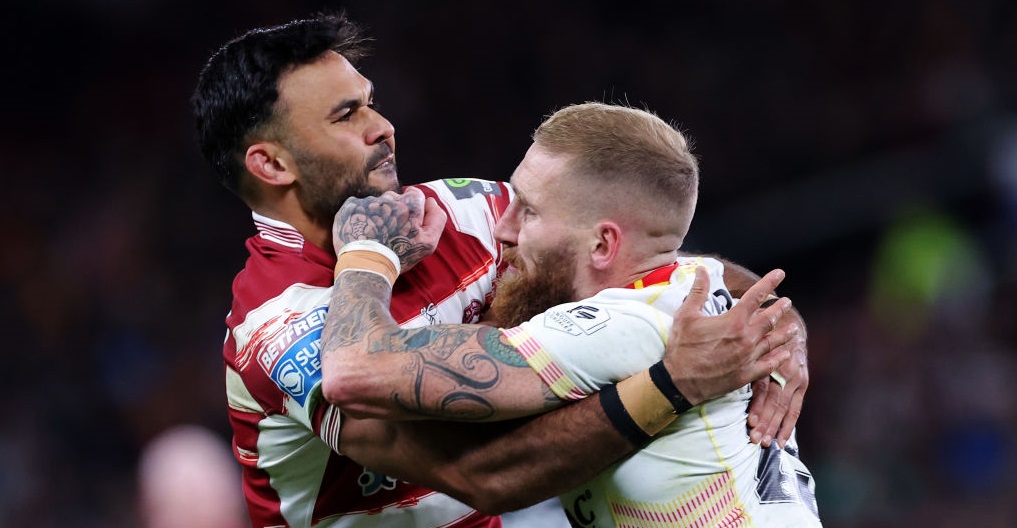Rugby league to follow union in lowering tackle height

Rugby league is set to follow the lead of rugby union in lowering tackle height from 2024 onwards.
The Rugby Football League (RFL) has announced significant changes to tackle height regulations, following the acceptance of 44 recommendations from the sport’s Brain Health and Clinical Advisory Group Sub-Committees.
The new adjustments – which echo the changes made confirmed by the RFU earlier this year – will impact the Betfred Super Leagues (Men and Women) as well as community clubs.
Since 2021, the RFL collaborated with Leeds Beckett University on the TaCKLE Project, led by Professor Ben Jones, RFL’s Strategic Lead for Performance and Research. Special mouthguards, implemented since 2021, facilitated studies on head acceleration exposures, leading to research projects and law trials in the 13-man code.
Major changes include the mandated use of the latest mouthguards in professional rugby league through a partnership with Prevent Biometrics.
There are also off-field changes. There will be a mandated off-season of four weeks, match limits over a 12-month period, and the introduction of independent concussion spotters on a trial basis in 2024.
Changes to the tackle height laws in Community, Junior and Age Grade Rugby League in 2024… pic.twitter.com/fN6WUnAbgp
— Rugby Football League (@TheRFL) December 8, 2023
Community rugby league and age grade rugby league will witness immediate and fundamental changes starting the 2024 season. Notably, the legal limit for contact at these levels will be lowered from shoulder height to armpit height. Contact above the armpit will result in penalties. The rule changes follow successful Laws Trials in the Under-18 Academy competition in the summer of 2023.
Twelve of the 44 recommendations specifically address various age groups. Touch/tag rugby will replace contact rugby in a phased approach, starting with Under 6s and 7s in 2024. The changes align with the Safe Play Code established in 2019 and will be mandatory for all age groups from 2024.
Additionally, a winter break will be enforced from the third weekend in November until January across community rugby league, except for schools, colleges, and student rugby league offerings.
RFL’s Chief Executive Tony Sutton, who also chairs the Brain Health Sub-Committee, unveiled the recommendations at a media conference on December 7, emphasizing the aim to increase Rugby League’s appeal and accessibility, particularly at junior and community levels.
“In stressing the significance of these recommendations which have now been ratified by the RFL’s independent Board of Directors, we acknowledge the challenges they will pose for those at all levels of the sport,” said Sutton. “We believe they are essential, as Rugby League must respond to developments in medical and scientific knowledge to prioritise the safety of those that play; and also that they offer exciting opportunities to increase the appeal and accessibility of Rugby League, especially at junior and community levels.
“Rugby League will remain a tough, gladiatorial and character-building team sport. But we believe the mandating of tag/touch at the introductory levels – initially Under-6s rising to Under-8s from 2026 – and the reduction in the legal tackle height at all levels from 2025 will place a new emphasis on skill and attacking play, further increasing the appeal of Rugby League both to parents, and to open-age community players.”
He also asked for the support of the rubgy league community in bringing through the changes. As with rugby union, which is lowering tackle height to below the sternum, there’s been considerable backlash against the move.
“Those discussions and explanations will continue throughout the winter ahead of the start of the 2024 season. My plea to all involved in the sport would be to recognise the fundamental importance of our match officials in introducing these changes. That was reinforced by the challenges faced by the group who were involved in the Academy Laws Trials last summer, to which they responded admirably. Next year more than ever, they will all need and deserve our support.”











































































